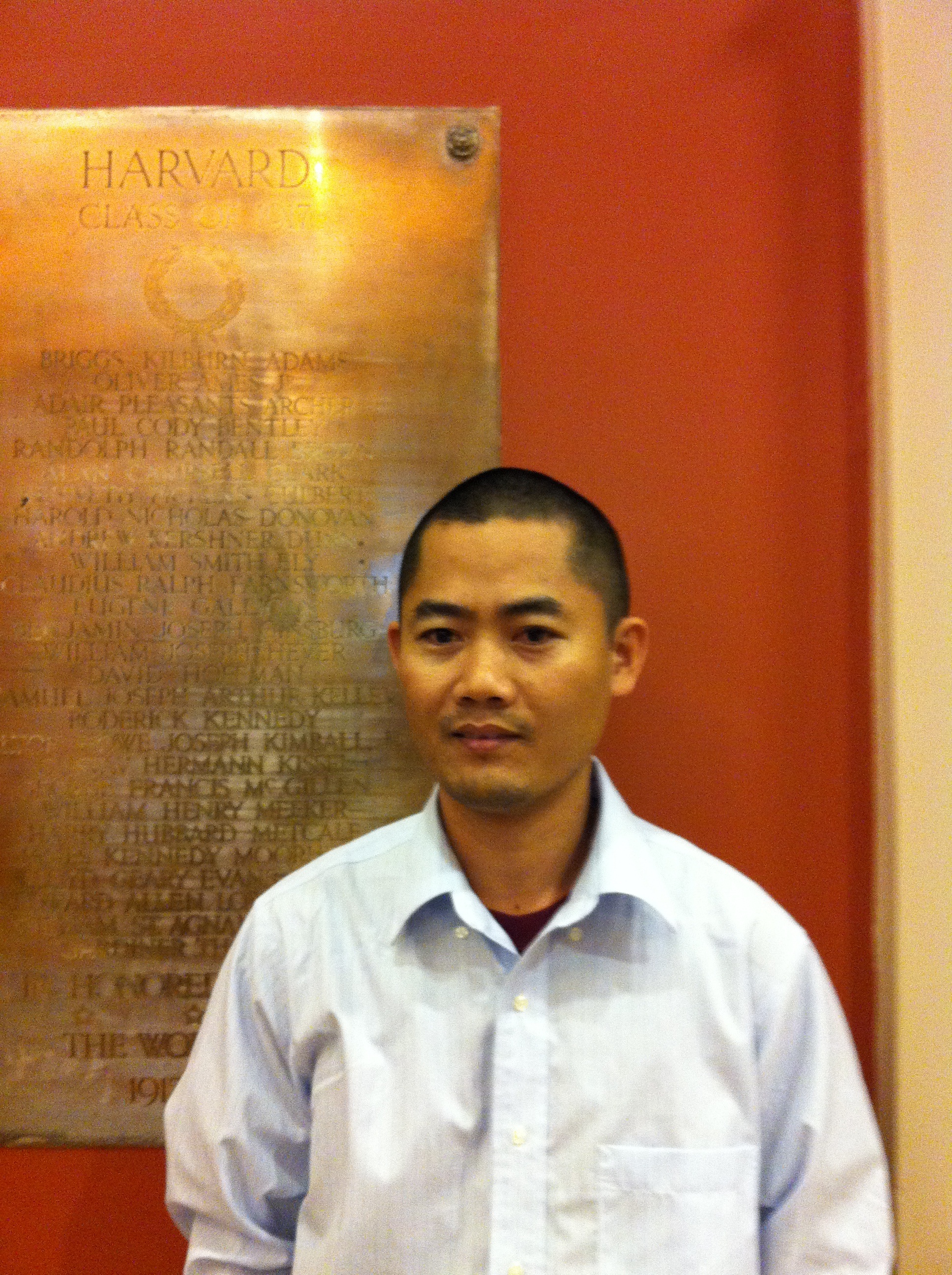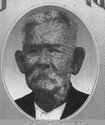Tararith Kho is a Cambodian author and poet who’s made a name for himself in his homeland and in American literary circles. He’s currently a Scholars at Risk Fellow at Harvard, and from 2010 and 2011 was a fellow at Brown University’s International Writing Project. His books and poetry anthologies include Lesson of Life (1998), Culture Should Not Stay Alone (2006), Regretful (2009), Red Print (2010), and Khmer Nigeria Poetry (2011).
In a country where writers were either wiped out or fled under the Khmer Rouge regime — and have had little space since — he’s one example of a talented scribe breathing life into Cambodian literature.
Tararith Kho.
Tararith has an enthralling story: he was born in 1974 and grew up near the Thai-Cambodian border in Oddar Meanchey and then in Siem Reap, two war-ravaged provinces. After surviving Pol Pot’s Killing Fields and the subsequent civil conflict of the 1980s, he relocated to Phnom Penh in 1991, where he worked as a motorbike driver, builder, house cleaner, and writer.
In 1999, he received a bachelor’s degree on a scholarship from the Royal University of Phnom Penh. He helped found the Nou Hach Literary Journal, but was forced to resign in 2010 after receiving threats by e-mail and phone.
1. Can you tell me about your childhood in Oddar Meanchey and Siem Reap, and what inspired you to become a writer?
When I was a kid, I was a native of Oddar Meanchey Province. Like the other kids, I knew nothing about war or peace or justice. I could not judge my society. On certain days, I felt fortunate because I had food to eat, and on other days, I was unhappy because there had been bombs going off and grenades exchanged between the Khmer Rouge and the Vietnamese in my village. My life depended on fate, and my ability to pull myself up by my bootstraps. Many of my friends died young; some got injured by land mines, or persecuted by either the Vietnamese armies or the Khmer Rouge.
I remember, when I went to primary school, that our school had no books, pens, or pencils. Me, my friends, and my teacher wrote on the blackboard with chalk or raw clay. We never had any newspaper to read, nor radio to listen to. We could not travel to other provinces without a permit from the communist authorities.
One day, I went to listen to a radio broadcast with a group of adult villagers in a cave. I heard “Voice of America” talking about Cambodia’s situation–the Cambodian Civil War. I then found out that my whole country was jeopardized by war. I began to think about a plan to help my friends and neighbors to escape to safety, maybe to seek asylum in Thailand temporarily. Many people I knew went to join the Freedom Fighters Army organized by Son Sann and his supporters, or the other army group supported by Norodom Ranarridh. Both army groups were operating independently from each other to fight the Vietnamese invasion in Cambodia.
I became a writer when I moved to Siem Reap to attend high school, after I was inspired by classic poems written by Krom Ngoy. I then began writing poetry pertaining to Krom Ngoy’s biography and his legacy. I loved to express my integrity and respect for his great discipline.
Krom Ngoy, 1865-1936, the father of Khmer poetry. Source: Khmerization
2. What was your first piece of writing and what brought it about?
As soon as I arrived in Phnom Penh, I started to find ways to help myself improve my writing skills in poetry. One of my poetic works was about a “water convolvulus:”
The drowning water convolvulus is sorrowful;
The water rises, and it must struggle to reach.
When it breaks the surface with its new, fragile leaves
Life is safe for the night.
In the morning, only the old growth is left standing,
And the jealous people eat the new shoots.
While the drowning water convolvulus mourns the loss,
For it had believed that its struggle would win it life.
This poem reflects the cultural meaning of our Khmer saying, “сЮАсЯТсЮКсЮ╖сЮЕсЮПсЯТсЮЪсЮ╜сЮЩ”–that which is beautiful is often cut off and taken away. It’s a metaphorical poem. Once upon a time in the past, Cambodia was a large empire where the Temple of Angkor was built–the temple remains a landmark and is a wonder of the world today. I wrote this poem to encourage other Cambodian readers to help one another rather than to cut each other down.
3. Some of your poems mention the land evictions and political repression of Cambodia today. Do you worry about angering government officials?
As you have seen, Cambodian civilians have been oppressed by high-ranking government officials. When I write, I quote comments from general civilians. I advocate strongly for freedom of expression. It is my interest, as a writer, to write what I see and feel. I have received repeated warnings and threats against my life. I have people who have witnessed that my life was also on the edge for speaking on behalf of the oppressed to advocate for human rights and freedom of expression.
4. When you return to Cambodia, will you keep on being a writer?
Everywhere is my place to write.
5. Who’s your favorite Cambodian writer? Do you have a particular work or genre that speaks to you?
I like King Ang Doung (1796–1860) because his poetry is very romantic. KAKEY is his best poem; it describes a woman’s beauty, and how love was betrayed. As far as genres go, I like criticism, but in Cambodia, there are few writers who write criticism.
6. I see you’re trying to foster the talents of young Cambodian writers. What’s your opinion on the state of Cambodian literature today? What can be done to improve it?
Freedom of speech inside Cambodia is truly limited. In general, writers do not receive funding nor support from the government, local foundations, and other organizations. Only those whose works promote the government can sometimes receive funding and other support. They usually earn stipends from men who hold political power, if these men feel flattered by the poems.
To encourage, improve, and advance our other writers, we need support from other writers around the world to help provide Cambodian writers with academic or professional training, seminars, exchange writers, translation and publication and partnership.
7. A lot of Cambodian writers and bloggers seem to write in English instead of Khmer. What’s your opinion on this? Do you think more needs to be done to foster the Khmer language as a writing medium?
I have seen that most good Khmer writers cannot write well in English. Some members of the new generation may know English and can write bilingual texts. However, it is good for them to express their thoughts and feelings in whichever way they feel comfortable. For those who can express themselves better in Cambodian, they should continue to write in Cambodian. They don’t have to wait to learn English in order to blog. As you see today, many Cambodia writers own blogs which have content in both Khmer and English. Thoughts and feelings have no borders. Express in the best way you can.
8. What’s your goal in the Harvard fellowship? Are you writing another anthology there?
My goal at Harvard is improve my analytical thinking and writing skills. I plan to publish more poems, as well, maybe in the Cambodian language, since it is the language in which I can express my feelings and thoughts the most deeply. It can be later translated, when I have the chance. Cambodia is my homeland, and I miss it deeply.
Geoffrey Cain is the Vietnam and Cambodia editor of New Mandala.
 Facebook
Facebook  Twitter
Twitter  Soundcloud
Soundcloud  Youtube
Youtube  Rss
Rss 
